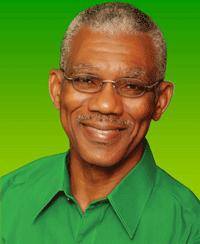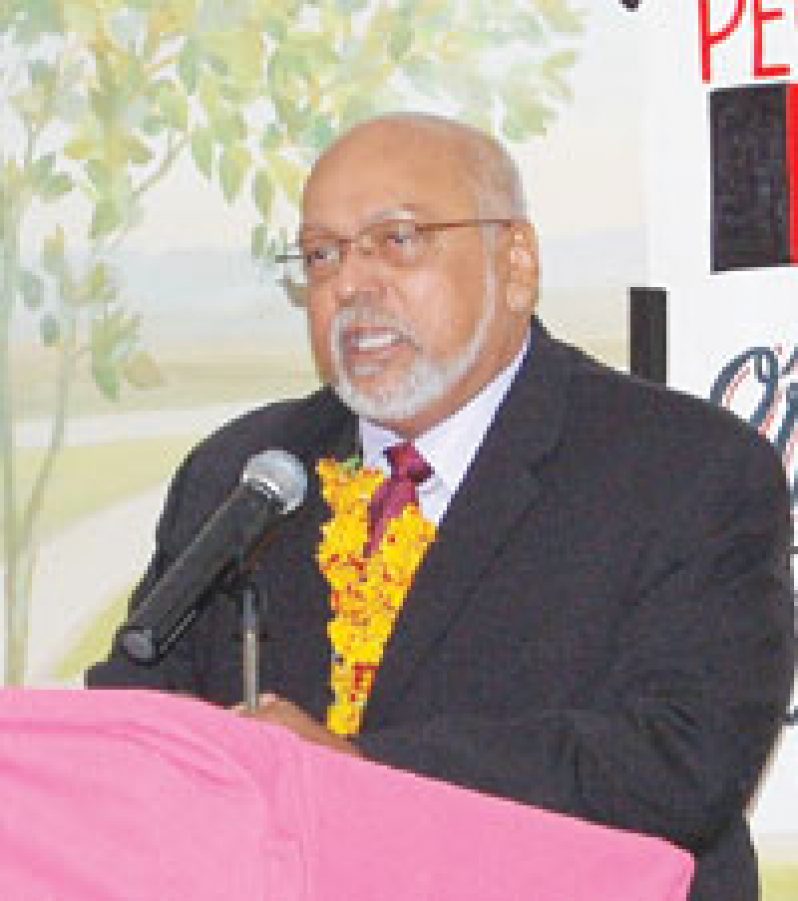BACK from St Lucia, where he made quite an impressive reported intervention in addressing major regional issues, such as climate change challenges and agricultural transformation focused on food security, President Donald Ramotar on Friday night lost no time in unleashing a verbal broadside against the parliamentary opposition—APNU and the AFC. He chose the occasion of the Third annual International Building Exposition to describe what he views as the opposition’s “crusade to taint
 |
 |
 |
 |
 |
everything the government does as corrupt…”.
Well, President Ramotar, who is also General Secretary (de facto leader) of the governing People’s Progressive Party (PPP), should know that it’s the work of an opposition, anywhere, to make politics. And here in Guyana the combined opposition’s choice of weapon to engage in such politicking is the hot issue of “corruption”—whether real or perceived.
In going on the offensive against the parliamentary opposition the President would be aware that they (APNU and AFC) are clearly out to exploit, to the fullest, as an anti-PPP government weapon, the recent call by former long-serving Speaker of Parliament and a political titan of the PPP, Ralph Ramkarran, in publicly urging the administration to address claimed “rampant corruption”.
And, given the fact that both APNU and the AFC are in the process of leadership changes, to unfold at their respective upcoming congress–with more interest in the vibrant competition within APNU’s dominant affiliate, the PNCR—this seems a good season to fan the flames of “government corruption”.
Political and financial corruption is currently a hot topic in various CARICOM member states of our Caribbean Community and some—among them big ones such as Jamaica and Trinidad and Tobago—have felt compelled to pursue practical initiatives to address this political sickness in the body politic.
Therefore, while he can be expected to maintain his political passion against the parliamentary opposition’s anti-government “corruption crusade”, President Ramotar has a moral and political obligation to bite the proverbial bullet in exercising creative initiatives of his own.
Moreso, in the context of the recent dramatic development of Ralph Ramkarran’s sudden resignation from the PPP last month (June 30) shortly after his column in the party-aligned “Mirror” newspaper calling for official action to effectively deal with public corruption.
In this particular instance the perceived necessity for the President to assert his enormous constitutional power as Head of State to set in motion inauguration of an anti-corruption programme as a creative and central feature of the administration he has been heading since last November 28 general elections.
NEW MAJOR INITIATIVES
**One such initiative that deserves priority action—given expressed concerns in various quarters, including the vital private sector— is the establishment of a Procurement Commission. The need for such a system for improved governance has been in the “talking” category for almost ten years.
This Commission, as earlier envisaged when the idea first emerged, would oversee the work of the Tender Boards that, traditionally, comprised public servants and are viewed as lacking teeth in arresting claimed unethical practices in the approval of contracts.
**Secondly , there is a perceived need for enactment of legislation governing the ethical behaviour of ALL Parliamentarians as well as identified categories of public servants.
**Thirdly, to ensure the FUNCTIONING of a properly structured Integrity Commission with INVESTIGATIVE powers.
This could be pursued after making a proper assessment of what obtains in a few CARICOM states. In particular Jamaica, where the system appears more appealing and also how to avoid undesirable and painful weaknesses as recently discovered in Trinidad and Tobago. For instance the case involving former Prime Minister Basdeo Panday
He has just been acquitted by a High Court judge in the case involving a foreign bank account, and with the Integrity Commission being given a severe tongue-lashing for failing to demonstrate, of all things, “integrity” in the action it had recommended against the former PM and founder-leader of the United National Congress (UNC).
Here in Guyana, President Ramotar’s administration, it is felt, should spend less time worrying over the expedient obsession of the opposition’s partisan politicking over public corruption and to focus, instead, on creative initiatives for improving the quality of democratic governance.
In so doing it would make a worthwhile difference for other CARICOM partners as well in the manner that Guyana has been successful in remarkable sustained economic growth over the past four years.
After all, the main opposition party, currently located within APNU, namely PNCR, has NO history in government of establishing any anti-corruption mechanism of significance during its long, consecutive 28 years of power, based on crooked national elections and rampant abuse of power and corruption.
SOME REALITIES
During those years public silence on financial and political corruption was simply the norm among all leading and influential party personalities—quite a sobering contrast to, for example, that of the PPP’s Ramkarran who is currently at the centre of varying media and political attention over his call on the need for official action to address corruption claims.
This observation would not be a welcome reminder for the opposition parties, particularly the PNCR, currently in the final stages of preparing for its three-day congress scheduled to begin on July 27.
Nor should this political reality be viewed as rationalisation for the disappointing failures by successive PPP/C administrations to have in place EFFECTIVE mechanisms to combat corruption and, generally, avoid the undermining of good governance.
There is also the reality to be faced that rather than spending time and energy quarrelling with the APNU/AFC opposition, President Ramotar, who is in government for the first time and heading a new administration, now has a very good opportunity to put his OWN leadership stamp on this current PPP/C administration.
Even, that is, as he seeks to meet with his long standing party comrade, Ralph Ramkarran, with hopes of getting him to withdraw his resignation made public by him on June 30.
Whether or not reconciliation occurs between Ramkarran and the PPP, more importantly President Ramotar owes it to himself to engage in quiet, sober reflections on how he personally would like his first government to be objectively assessed in terms of leadership; new policies; as well as creative administrative initiatives that include functioning of the Presidential Secretariat.
Meanwhile, we must also await the outcome of the coming contest for a new leader of the PNCR with David Granger and Carl Greenidge as the leading nominated contenders to succeed Robert Corbin. He has finally chosen to give up that position although his influence could still linger, for better or worse, within the party for some time yet.




.jpg)









